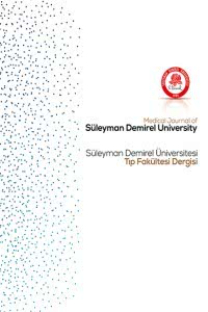TSH DÜZEYİ NORMAL, DÜŞÜK VE YÜKSEK HASTALARDA VÜCUT KİTLE İNDEKSLERİNE GÖRE HDL DÜZEYLERİNİN KARŞILAŞTIRILMASI
COMPARISON OF HDL LEVELS ACCORDING TO BODY MASS INDEXES IN PATIENTS WITH NORMAL, LOW AND HIGH TSH LEVELS
___
- 1. Obesity and overweight. Available at: https://www.who.int/ news-room/fact-sheets/detail/obesity-and-overweight. Erişim tarihi: 23.09.2021
- 2. OECD Health Statistics 2014. Available at: https://www.oecd. org/els/health-systems/oecd-health-statistics-2014-frequently-requested-data. Erişim tarihi: 23.09.2021
- 3. İslamoğlu Y, Koplay M, Sunay S ve ark. Obezite ve Metabolik Sendrom. Tıp Araştırmaları Dergisi. 2008; 6: 3.
- 4. Carantoni M, Vigna GB, Stucci N, et al. Low Levels of HDL Cholesterol in Hypothyroid Patients with Cardiovascular Diseases. Minerva Endocrinol. 1997; 22(4): 91-7.
- 5. Reinehr T, Andler W, Denzer C, et al. Cardiovascular Risk Factors in Overweight German Children and Adolescents: Relation to Gender, Age and Degree of Overweight. Nutrition, Metabolism and Cardiovascular Diseases. 2005; 15(3): 181-187.
- 6. Burke V, Beilin LJ, Simmer K, et al. Predictors of Body Mass Index and Associations with Cardiovascular Risk Factors in Australian Children: A Prospective Cohort Study. İnternational Journal of Obesity. 2005; 29(1): 15-23.
- 7. Ekinci F, Coşkun DM, Tuncel B ve ark. Relationship between Obesity and Thyroid Function in Adults. Marmara Medical Journal. 2018; 31: 76-80.
- 8. Buscemi S, Verga S, Maneri R, et al. İnfluences of Obesity and Weight Loss on Thyroid Hormones. A 3–3.5- Year Follow- Up Study on Obese Subjects With Surgical Bilio-Pancreatic Bypass. J Endocrinol İnvest. 1997; 20: 276-81.
- 9. Manji N, Boelaert K, Sheppard MC, et al. Lack of Association Between Serum TSH or Free T4 and Body Mass İndex in Euthyroid Subjects. Clin Endocrinol. 2006; 64: 125-8.
- 10. Altunoğlu E, Ülgen E, Müderrisoğlu C ve ark. Obezite ve Tiroid Fonksiyonları. İstanbul Tıp Dergisi. 2009; 1: 24-5.
- 11. Shinkov A, Borissova AM, Kovatcheva R, et al. The Prevalence of the Metabolic Syndrome Increases through The Quartiles of Thyroid Stimulating Hormone in A Population-Based Sample of Euthyroid Subjects. Arq Bras Endocrinol Metabol. 2014; 58: 926-32.
- 12. Lagrost L. Regulation of Cholesteryl Ester Transfer Protein (CETP) Activity: Review of invitro and invivo Studies. Biochim Biophys Acta. 1994; 1215:209–36.
- 13. Pearce EN, Wilson WF, Yang Q, et al. Thyroid Function and Lipid Subparticle Sizes in Patients with Short-Term Hypothyroidism and a Population-Based Cohort. J Clin Endocrinol Metab, 2008; 93: 888–94.
- 14. Lam KS, Chan MK, Yeung RT. High-density Lipoprotein Cholesterol, Hepatic Lipase and Lipoprotein Lipase Activities in Thyroid Dysfunction-Effects of Treatment. QJ Med. 1986; 59: 513–21.
- 15. Dullaart RP, Hoogenberg K, Groener JE, et al. The Activity of Cholesteryl Ester Transfer Protein is Decreased in Hypothyroidism: A Possible Contribution to Alterations in High-Density Lipoproteins. Eur J Clin İnvest. 1990; 20: 581-7.
- 16. Duntas LH. Thyroid Disease and Lipids. Thyroid Journal. 2002; 12(4): 287-93.
- 17. Asvold BO, Vatten LJ,Nilsen IL, et al; The Association Between TSH Within the Reference Range and Serum Lipid Concentrations in a Population-Based Study. The HUNT Study. Eur J Endocrinol. 2007; 156: 181–6.
- 18. Kung AW, Pang RW, Lauder I, et al. Changes in Serum Lipoprotein(a) and Lipids During Treatment of Hyperthyroidism. Clin Chem. 1995; 41: 226–31.
- 19. Aviram M, Luboshitzky R, Brook JG. Lipid and Lipoprotein Pattern in Thyroid Dysfunction and the Effect of Therapy. Clin Biochem. 1982; 15: 62–6.
- ISSN: 1300-7416
- Yayın Aralığı: Yılda 4 Sayı
- Başlangıç: 1994
- Yayıncı: SDÜ Basımevi / Isparta
COMORBID PSYCHIATRIC DISORDERS IN SOME COMMON NEUROLOGICAL DISEASES
Ümit GÖRGÜLÜ, Nermin GÜRHAN, Yasemin YALÇIN AKMAN, Kevser ALTAY, Ülkü POLAT, Şükrü ÖZEN, Behçet COŞAR, GİRAY KOLCU
Hüseyin Sina COŞKUN, Lokman KEHRİBAR
Çağdaş BİÇEN, ABDULLAH MERİÇ ÜNAL, Ahmet EKİN, Mustafa ÖZKAN
HEMATOLOGICAL FINDINGS IN CHILDREN WITH VITAMIN B12 DEFICIENCY
İLK TRİMESTER GEBELİKLERİNDE SUBKLİNİK VE AŞİKAR HİPOTİROİDİ İNSİDANSI
GEBELİKTE AKUT APANDİSİT OLGULARINA YAKLAŞIM; BİR DEVLET HASTANESİ PRATİĞİ
SURFACE MODIFIED TITANIUM DIOXIDE/POLY (LACTIC ACID) NANOCOMPOSITE FILMS FOR TISSUE ENGINEERING
Şükran Melda ESKİTOROS TOĞAY, Ulya TOKGOZ
AKUT AŞİL TENDON RÜPTÜR TEDAVİSİNDE MİNİ-AÇIK VE PERKÜTAN TAMİR YÖNTEMLERİNİN KARŞILAŞTIRILMASI
